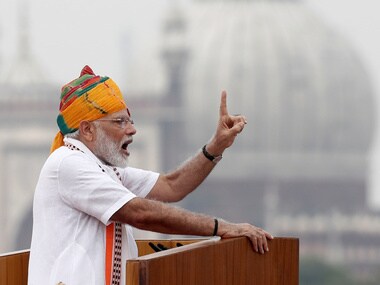Narendra Modi has completed
100 days in his second consecutive stint as prime minister in the BJP-led NDA government. The government has already highlighted (and is continuing to highlight) many of its legislative, political, fiscal and reformative successes/agendas. The NDA is also grappling with one of its toughest challenges — deepening anxiety in India over jobs and growth amid
threats of a recession in the Asian economy. Amid these crosscurrents, it is worth noting the culture of change that Modi has already triggered in India’s political milieu within a relatively short span of time. The 100-day milestone has been marked by a paradigm shift in governance approach — from consolidation in the first term to disruptive political maneuvers in the second, from game-changing policy shifts in first term to delivering on core BJP agendas in the second, from taking stock of seemingly intractable legacies in the first term to demolishing them in the second. Modi has also shown a remarkable capability to take risks and remain steadfast on convictions amid fierce pushback. Amid these shifts, continuity lies in bringing about transformative changes in citizens’ lives, but that continuity is now moored in the bigger trust that Modi enjoys among voters. The prime minister has managed to increase his political capital. His already-high stature among the electorate has heightened further, but it would be wrong to interpret the amplification of his appeal as merely the sum total of BJP’s ideological, political and electoral hegemony. Modi isn’t popular just because BJP won a thumping majority in elections. There’s more to it. [caption id=“attachment_7313101” align=“alignleft” width=“380”]
 Narendra Modi delivering his 2019 Independence Day address from the Red Fort. Reuters[/caption] During the start of his second stint, Modi had added one more element to his slogan of ‘sabka saath, sabka vikas’ — that of ‘sabka vishwas’. In his second stint, the radical shift in the governance approach has been underwritten by this trust. The electorate seems to believe that Modi’s actions are guided by selfless dedication for the nation, and his only agenda is heightening India’s stature in the comity of nations and ensuring a better life for its citizens. As BJP vice-president and former MP Baijayant Panda has written in
Hindustan Times, “with every disruptive move, he (Modi) confounded conventional political wisdom, and enraged opponents. But voters understood these were in the long-term interest of the nation, by a man who had no axes to grind, and no vested interests. And they wanted more of the same.” Bringing about this shift in public perception has been Modi’s greatest achievement. The government’s game-changing moves on Jammu and Kashmir, passing of a record 30 bills in the Monsoon Session of Parliament including key legislations such as criminalising triple talaq, amendment to the RTI Act, amendment to the Unlawful Activities (Prevention) Act despite lack of numbers in the Rajya Sabha are significant achievements that may impact India’s national security and have ideological, political, legislative and even diplomatic ramifications. However, the most under-rated and under-acknowledged change has been the way in which the electorate has shifted its stance from “reflexive cynicism” towards the government’s nation-building agenda to “implicit trust”. Increasingly, Modi has been able to encourage the electorate into becoming stakeholders into his projects. From a drive towards a cleaner India through the Swachh Bharat scheme to making water conservation a national mission, from the crusade against single-use plastic to showcasing India’s space prowess through lunar missions, the prime minister has been able to inspire citizens and ensure their participation in nation-building. From a position where all government schemes were perceived as “scams” to dupe the public to turning them into mas movements dominating national conversation, Modi has created a relationship based on trust with the voters, and this relationship has catapulted him head and shoulders above his rivals and demolished the political Opposition. We got an indication of voters’ trust in Modi even before the Lok Sabha elections took place through the second
National Trust Survey conducted by Firstpost-IPSOS, which polled more than thirty-one thousand voters from 2 March to 22 March and projected Modi’s approval rating at 63 percent, quadrupling his lead over nearest rival Rahul Gandhi.
Narendra Modi has shown a remarkable capability to take risks and remain steadfast on convictions amid fierce pushback.
Advertisement
End of Article


)
)
)
)
)
)
)
)
)



